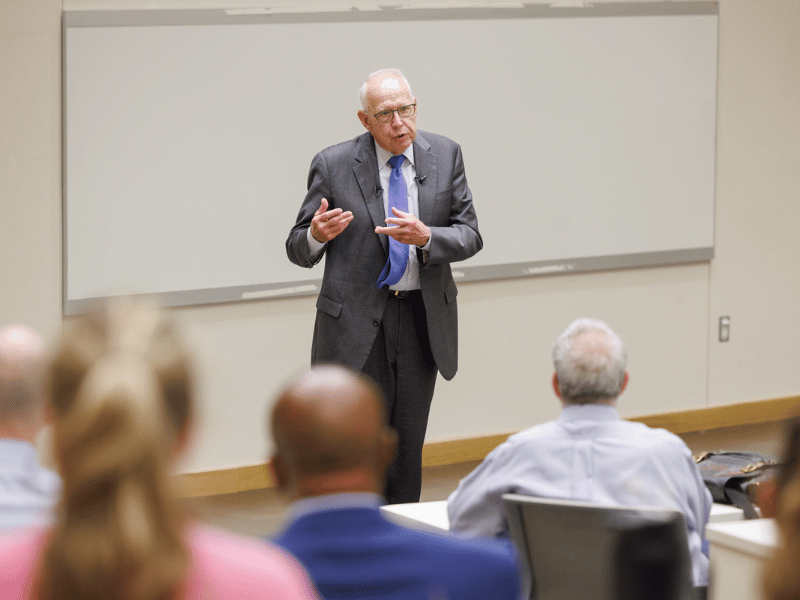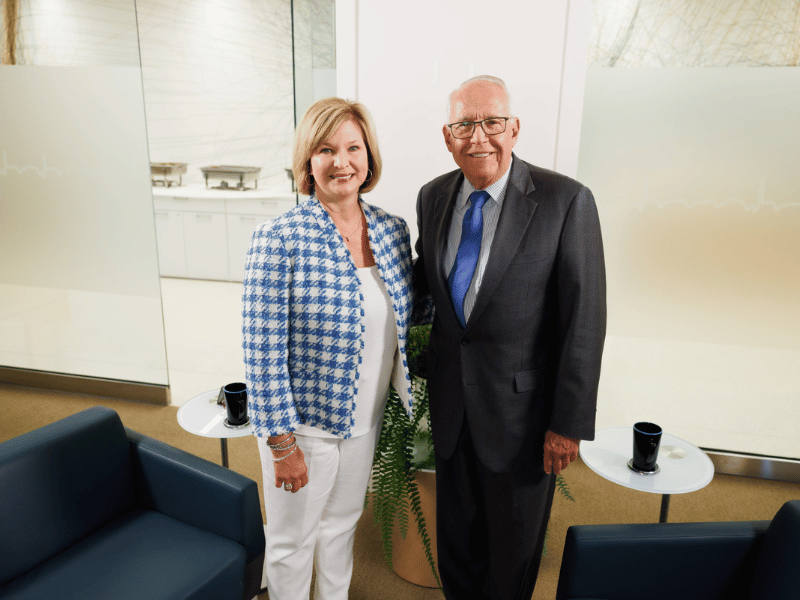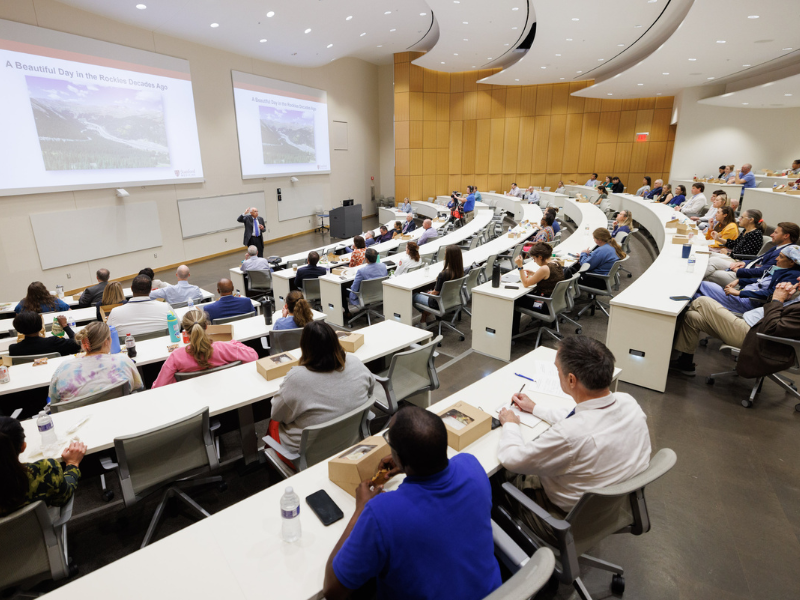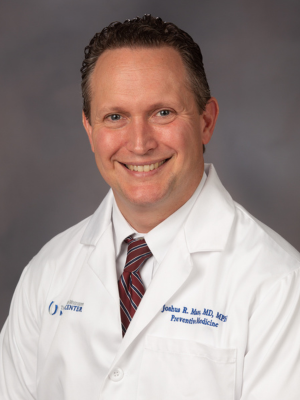Lecturer Kirch champions openness, sharing, support when burnout and health care collide

The plane that crashed into the trees on a clear fall day in 1970 scarred more than a Colorado mountainside.
More than 30 lives were lost, and Dr. Darrell Kirch stills see in his mind a massive fireball and a young man, stumbling through the trees, his clothes burned away.
Kirch, now emeritus president and CEO of the Association of American Medical Colleges, was on a surveying team when he helped pull people from the flaming wreck: a day “seared into my consciousness,” he said.
Because of his mental scars, he would need rescuing, too.
Kirch told his story last week as the featured speaker for the Vice Chancellor Lecture Series at the University of Mississippi Medical Center; his subject was well-being – and how his own well-being suffered during his days as a medical student plagued by nightmares.
No one in the audience of faculty, students and staff could have doubted the topic’s importance. As Kirch pointed out, burnout among physicians is dramatic and rising and disturbs the equanimity of health care workers across the board.

Lending his voice to the cause of resilience now occupies much of his time, as Dr. LouAnn Woodward explained in her introductory remarks. Mental health has been the lifeblood of a career for Kirch, a psychiatrist, neuroscientist and distinguished educator.
“He has done it all,” said Woodward, vice chancellor for health affairs and dean of the School of Medicine, who praised Kirch for his “impact and broad influence on academic medicine.
“And, for at least the last decade, he has championed the Medical Center on the national stage.”
The Denver native went national long ago. A University of Colorado School of Medicine graduate, Kirch began his academic career at the National Institute of Mental Health, becoming chief of the Schizophrenia Research Branch.
He has led the Medical College of Georgia and the Pennsylvania State University Milton S. Hershey Medical Center. He is a recipient of the Outstanding Service Medal of the United States Public Health Service.
For 13 years, until 2019, he was president and CEO of the AAMC which represents U.S. and Canadian medical schools, teaching hospitals, health systems and more. Among the organizations he serves is the Board of Regents of the American College of Psychiatrists.
But, if not for the events of Oct. 2, 1970, he might still be working outdoors “loving life in the mountains.”
Kirch was surveying for a tunnel that would run through the Continental Divide when, on a lunch break, he spotted a slow-flying plane over a Rocky Mountain valley near Silver Plume. He was there because he had abandoned his college philosophy studies to take a job he enjoyed.
“I thought I would never go back to school,” he said. That thought would soon crash and burn.
The twin-engine prop plane, carrying players, coaches and others from the Wichita State University football team, was flying too low when it “pancaked into a mountain and exploded in a ball of flame,” Kirch recalled. His “defining moment” spoke to him as he ran toward the wreckage and spotted some of the victims, many his own age.
“It said to me, ‘Life is serious,’” he said. Reconsidering his future, he focused on doing something meaningful. He entered medical school. He also entered a period of anxiety, depression and disabling panic attacks.

As a first-year student, Kirch dissected a body in the gross anatomy lab. Afterward, late at night as he tried to sleep, his cadaver chased him in his dreams. Unable to cope with medical school, or so he thought, he was ready to drop out. Instead, he accepted an advisor’s recommendation and saw a psychiatrist.
“I got the help I needed and went back,” he said, and became “a reasonably good medical student.”
Later, as he advanced in his profession, periods of panic attacks and depression arose “in a parallel universe to my medical career.” Clearly, he had “post-traumatic stress,” he said.
Burnout is not the exception for physicians, nurses and other health care workers, Kirch argued. “It was always there, in the shadows.” Consequences include cynicism, depression, lack of empathy, turnover and decreased patient satisfaction.
“The ultimate expression of mental stress” is also a risk, he said: As many as 400 physicians die by suicide each year in the U.S., a salient point in a report Kirch co-authored: “To Care is Human – Collectively Confronting the Clinician-Burnout Crisis.
Kirch helps take on these challenges as co-chair of the National Academy of Medicine Action Collaborative on Clinician Well-Being and Resilience, advancing solutions and raising visibility of these issues – issues that have, only lately, been confronted pointedly in health care.
In medical centers, chief wellness officers have been rare or non-existent until relatively recently. In 2018, UMMC started its Office of Well-being.
It’s directed by Dr. Joshua Mann, professor and chair of the Department of Preventive Medicine, who said it’s a significant part of a commitment at UMMC to de-stigmatize mental health and burnout, set up support systems for faculty, students and staff who need help, and work to promote a positive workplace experience.

“Our efforts at UMMC align very well with the burnout prevention framework Dr. Kirch described,” said Mann, who attended Kirch’s lecture.
“The most striking thing to me about his presentation was his transparency, his vulnerability, about his own experience with mental health challenges.
“I had some really low times myself during my first semester of medical school here,” said Mann, a 1996 School of Medicine graduate. “I struggled to get guidance on how to adapt to the fast pace of medical school and the realization that it was going to be a struggle, for the first time in my life.
“If the Medical Center’s Student Counseling and Wellness Center had existed at the time, I believe it would have been very helpful for me.
“Hopefully, now we’re doing a better job, not just here, but also across the entire culture of health care, so that people feel free to seek out help.”
A “culture of well-being” is on the rise, Kirch said during his remarks. But, when the pandemic struck in 2020, he feared it would retreat “back into the shadows.”
Instead, the opposite happened as people tried to cope with “the moral injury” they experienced during COVID.
“But we’re still struggling,” he said. What clinicians need from their health care organizations can be summed up in these requests, he said: “hear me, protect me, prepare me, support me, care for me and honor me.”
He put out a call for more professionals like him to become involved, those who have coped with their own kind of trauma. “The most powerful tool we have is to share our stories,” he said.
During his years as a medical college dean, at least two students died by suicide, he said. He still wonders what might have happened if he had publicly revealed his own scars.
“You should be very, very proud of your institution,” Kirch told his listeners. “You have benefitted from wonderful leadership … . You are a crown jewel for the state and its educational system.
“Most of all, take pride in yourself. If you struggle, reach out. If you have struggled, share your story.”
Learn more about Kirch and his perspectives by watching the next VC Notes Coffee Talk with Dr. LouAnn Woodward, scheduled for release on Sept. 8.


